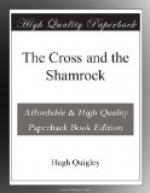In the mean time, Aloysia’s room was besieged with crowds of anxious visitors and voluntary condolers on her resolution of renouncing wealth, pleasure, and Protestantism, for poverty, Popery, and penance. Rich merchants came, offering to settle annuities on her for life; rich widows came, with their tracts and Bibles in one hand, and their real estate deeds and scrip in the other, hoping to conquer her resolution; and eloquent parsons, with their “sweet speeches and flattering discourses,” were chasing one another, like clouds driven by the winds, to and from the well-furnished boudoir, all charged with the same apostolic office of saving a soul, a beautiful, interesting one, from falling into that world-wide “net” of Popery with which St. Peter and his successors have never ceased to “catch men,” since the days of Jesus Christ. All the discourses, prayers, entreaties, threats, crocodile tears, flatteries, misrepresentations, legacies, settlements, and other seductive allurements have miscarried, this time. A Catholic Aloysia was baptized, and a Catholic she is resolved to live and die, with God’s grace.
The “big dinner” was prepared at the rich man’s house, where Father Paul through courtesy attended, and where he was obliged to defend, in a speech of some length, the violent assault of that Parson Cashman, who we told was fishing for the hand of Aloysia, but who now, because she rejected him with scorn, had the bad taste to insult the whole company by his champagne-inspired attack on Ireland, her creed, and her children.
Paul completely refuted his charge of ignorance of the Irish, by contrasting their religious knowledge with that of the English and Americans; in the former one of which countries there are seven or eight millions of pagans, and in the later so many thousands who follow such impostors as Miller, Smith, spiritual rappers, Transcendentalists, Fourierites, and other impostors notorious for their crimes.
“The reverend gentleman forgets,” said he, “that Ireland was once, and for ages, the most enlightened country on earth, and deserved to be called “the Island of Saints;” and that whatever of ignorance, poverty, and crime—which, thank God, is little—she is afflicted with, was inherited by her from the curse introduced into her by the upas tree of Protestantism. Ah, sir, the eulogy of England comes with a bad grace from the lips of a son of America, which she oppressed, and which, but for Catholic arms, might be now, instead of a great republic, a badly-ruled province of Protestant England. Study history, sir; study history; and you will soon think better of Ireland and Catholicity, and less of England and her persecuting Protestantism.” And with that he retired.




